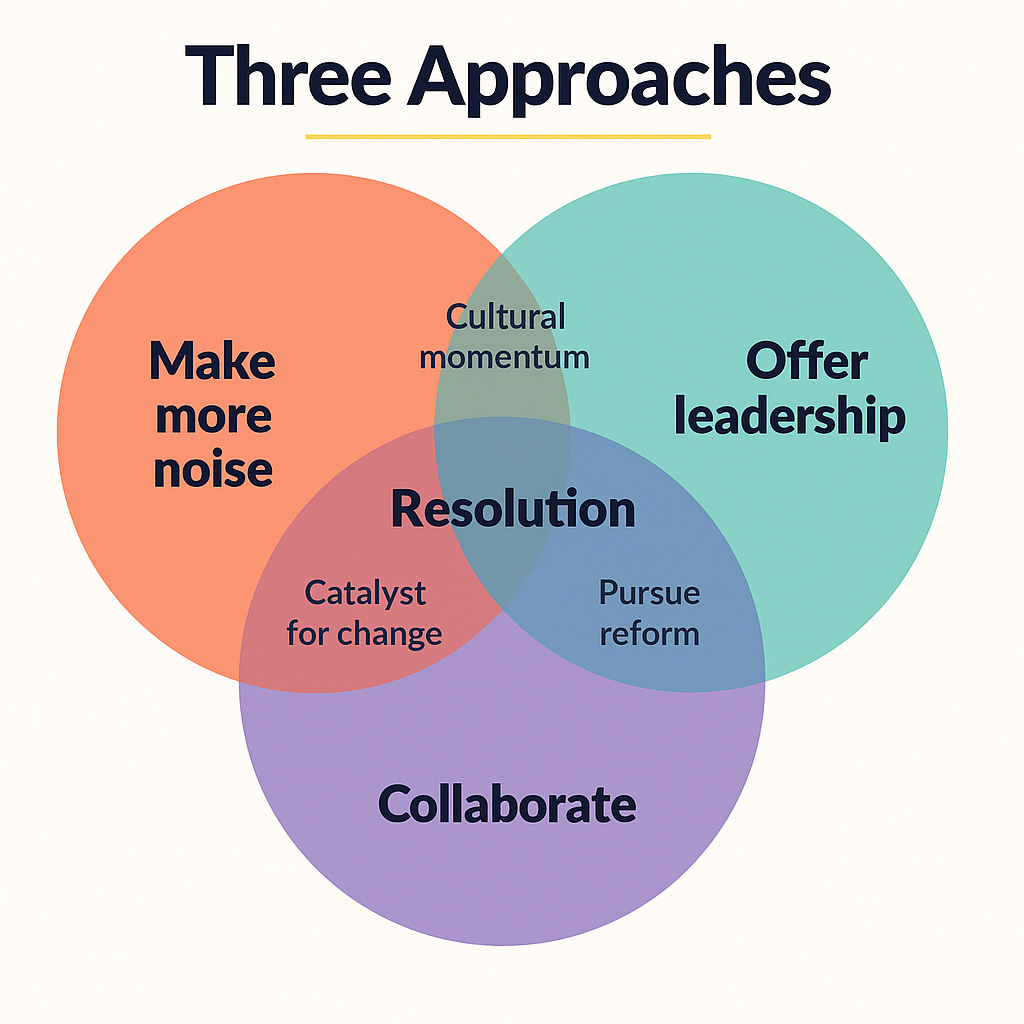Three Strategies for an Ideological Crisis
Understanding the Varied Responses to this Medical Scandal
In the midst of a scandal that is at once medical, cultural, and institutional, every profession faces a choice. Journalists must decide whether to be watchdogs or bystanders. Doctors must choose between protecting patients or protecting their careers. Academics must either challenge bad science or hide behind consensus. The list goes on but essentially, for responsible professionals, the question is stark. Stay silent and let lies take root, or speak out and say, “No, this reckless medical practice must end.”
When Mia and I interviewed Professor Gordon Guyatt, the father of evidence-based medicine, earlier this week, we knew the conversation would be important, but we did not expect the reaction it provoked. The fallout comes against the backdrop of McMaster’s treatment of SEGM, which Jesse Singal described as a “depressing dereliction of duty.” Many, however, saw McMaster’s behaviour as entirely predictable – a reminder that science is always downstream from culture, politics, and careerism.
During our conversation, Guyatt repeatedly declared that he was “no expert.” He seemed to believe there is something happening with “trans kids” that he does not understand, and that “the experts” know more than he does. By extension, McMaster as an institution has taken the same deferential stance.
For influential voices such as Guyatt, the instinct has often been to treat gender distress as a human rights issue. If being “trans” is seen as akin to being gay, evidence becomes secondary; the assumption of being “born this way” pushes data to the margins. From this perspective, it is easier to see why he would risk his legacy defending an indefensible position.
This is the dilemma at the heart of the crisis. Most people – the disengaged public – presume there are elements to “being trans” that are difficult to understand. They assume that experts have studied the field and that the lack of evidence reflects science not yet catching up, rather than the consequence of elaborate efforts to promote shoddy research that encourages heavy-handed interventions.
Yet anyone who has studied the literature knows there is no quality evidence to justify medicalising the identities of minors whose identities are still in mid-formation. That part is not really in dispute. What differs is how people respond to this reality.
In therapy there is a saying that you can gather evidence forever. At some point the task is no longer gathering evidence but taking action. That takes courage, clarity, and leadership.
A lack of integrity and courage has run through medicine, psychiatry, counselling, law, academia, journalism, feminism, and the gay rights movement. Mental health professionals should have set firm boundaries decades ago. Instead, ideology displaced clinical judgement. Medicine and academia gave it false authority, law enshrined it, journalism became a cheerleader instead of a watchdog, feminism traded hard-won insights for identity politics, and the gay rights movement shifted from defending same-sex attraction to embracing trans ideology.
History will record a shameful abdication of responsibility that left the public confused and misled. In the vacuum left by failed institutions, others have stepped in, and three primary strategies have emerged, each with its own strengths and flaws.
Three Different Strategies
The first is championed by figures such as JK Rowling, Billboard Chris, Matt Walsh, Graham Linehan, Riley Gaines, Gays Against Groomers, Meghan Murphy, Kellie-Jay Keen, James Esses, and many others. Their approach is to raise public awareness by exposing the harm caused by trans activists and their allies.
Although these campaigners are often worlds apart politically – and sometimes bitterly opposed to one another – they share a strikingly similar strategy. Because of this overlap, their differences are often missed by casual observers, and their impact is sometimes mistaken for a single, unified front. Many of them are not allies but adversaries marching in the same direction for different reasons, each in their own way forcing the issue into the public eye.
The risk of this approach is that the disengaged majority often dismisses it as little more than online hostility. Worse, it can attract trolls and thugs who bring out the worst in humanity and confirm the suspicions bystanders already hold.
The second strategy is adopted by organisations and commentators such as Dr Stephen Levine, Dr Az Hakeem, Lisa Littman, Marcus and Sue Evans, Helen Joyce, Maya Forstater, Holly Lawford-Smith, Julie Bindel, Colin Wright, Christina Buttons, Jamie Reed, Cori Cohn, Genspect, Do No Harm, the LGB Alliance, Transgender Trend, Thoughtful Therapists, and others. Though differing widely in emphasis and perspective, they share a commitment to unapologetic honesty about the harms of medical transition and trans ideology, coupled with solution-focused leadership. By presenting evidence without equivocation, proposing reforms, and modelling constructive alternatives, they are harder for institutions and politicians to ignore.
The weakness of this strategy is that a misinformed public can dismiss these advocates as extremist, believing it radical to argue that medical transition is harmful, that social contagion is a key element, or to oppose trans-identified men in women’s spaces.
The third strategy is pursued by SEGM, Therapy First, the Bayswater Support Group, Dr Ken Zucker, Dr Anna Hutchinson, Anastassis Spiliadis, Leor Sapir, Ben Ryan, Jesse Singal, Hannah Barnes, Helen Lewis and others. This approach seeks to engage gender-affirmative clinicians, pro-trans advocates, and policy-makers. Its strength is that it can reach audiences who would dismiss more challenging voices. By working within established systems, it creates space for debate that might otherwise remain closed.
The weakness is that by sidestepping the core question, this approach reinforces the harmful narrative that “trans kids” exist and that the real task is to identify who is “truly transgender.” As the disaster at McMaster showed, it can also drain vast amounts of time and resources in disappointing exchanges with ideologues and careerists. Like Boxer, the loyal horse in Animal Farm, these pragmatists may work themselves to exhaustion believing in change, only to be used up by the very system they hope to reform.
So there it is – three ways to address the issue: expose the harms, model solutions, or work within the system. These approaches tend to emerge during times of crisis, and all three were already in full flow when the Cass Review landed.
The Cass Moment
The Cass Review should have been the turning point; a comprehensive, damning analysis of gender-affirming care. GIDS was closed. The scandal was laid bare. From this point on, clarity was required. Yet, at the crucial juncture, leadership faltered. Many clinicians remained equivocal, and few were willing to say clearly that this was a harmful intervention that should never have been described as healthcare.
As a clinician myself, it took time to recognise that our tendency to talk issues to death was creating further harm. Higher education consultant Levi Pay recently highlighted the fallout of this “word salad,” pointing out that it encapsulates “the whole clinical approach that has created the mess we're in.” Pay describes the clinicians “analysing the harm, stroking their beards, dressing up what is going on with flowery language, displaying what Zucker calls ‘clinical etiquette’, telling themselves they are doing good work – and, all the while, the harm has grown every day more.”
Exactly seventeen months since Cass was published, activists have regrouped in the UK. NHS clinicians remain uncertain about how to understand, treat, or even speak about gender dysphoria, private clinics are cashing in, and a ban on conversion practices is expected to be introduced.
The Guyatt interview hammered home that while the science in this field is unimpressive, many continue to insist this is not the point. They argue we must provide these treatments to “trans kids” or risk causing irreversible harm while waiting for further research. Those who know the field recognise that high quality evidence is unlikely ever to arrive. You cannot prove a negative, so we will never get much stronger statements than we already have, multiple times: the evidence ranges “from low to very low certainty.” Flawed, biased, low quality research can claim almost anything, but high quality research – based on Guyatt’s own GRADE Framework – is unfeasible in this context.
Post-Cass, post-HHS, post-McMaster, we must face the truth. Chasing quality evidence is fast becoming like Captain Ahab hunting Moby Dick – an obsession that consumes time and energy yet yields little of substance. Rigorous research must continue, for the sake of the historical record, clinical practice, and policy debates. But we can no longer pretend it will shift the culture.
What Now?
Our review of the evidence showed that we could not produce a “Standards of Care” for medical transition, since that would mean using poor evidence to endorse a flawed premise. Instead, we developed the Gender Framework – a well-researched, non-medical alternative that prioritises sex over gender identity and psychology over ideology. Published by Pitchstone Publishers and launched at our Albuquerque conference later this month, the Framework offers guidance for schools, clinics, hospitals, prisons and other settings, providing a blueprint for a reality-based, developmental approach.
We believe this ongoing medical scandal is cultural rather than scientific or medical, and the real battle will always be for the public’s hearts and minds. The Gender Framework is our contribution to that effort – a practical, reality-based alternative to the failed medical model, grounded in do-no-harm principles and a least-invasive-first approach. It is only one step, but it marks a path forward.
Join Stella at the Bigger Picture Conference, where she will be speaking on “The Power of Group Therapy: Helping the Trans-Identified and the Detransitioners Together.”
Tickets selling fast - secure your seat now.






For all those that work in this field, we are grateful.
What a fantastic post....many thanks.
Your conversation with Dr. Guyatt was absolutely stunning and one of the very best you have ever done.